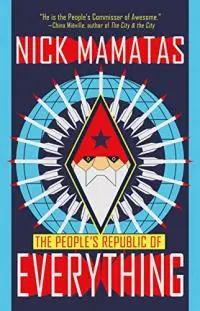Hello, and welcome back to Publishing 201—an occasional column in which I'll answer your questions about writing and publishing, so long as they haven't been asked and answered a million times already. There is plenty of 101-level advice out there, and thousands of writers who can repeat it, but very little has been written for writers further along in their careers or aesthetic development. If you have a 201-level question you'd like me to answer, reach out!
Here's a question, variations of which I receive all the time, that I have always refused to answer....until now.
I've been publishing fiction and non-fiction for years, but I still haven't landed a book publisher yet. Many writers I know say they got a break meeting their publisher at a convention. I don't really like conventions and I can only bring myself to schmooze so much. Should I suck it up and try harder, or are conventions not that important to a successful writer's career arc?
—Wondering in my Rabbit Warren
I hate this question for two reasons—the first is that it is a Publishing 101 question, and I'm answering 201 questions here. The answer is "No." The second reason is that the question usually isn't one. Rather, it is a request for permission: "Please tell me I can just stay home." All right, you can just stay home. In fact, these days, you have to stay home. But let's say that one day there will be conventions again...
What makes this question interesting is that Warren is pretty interesting: he's been writing and publishing for a long time, and already attends conferences and conventions with some frequency. So it's worth breaking things down a bit.
First, let's describe conventions, and conferences. Conventions are generally focused on genre fiction, and most often science fiction/fantasy/horror. They're the descendants of the early get-togethers science fiction fans who met via correspondence and fanzines would organize. Many are still fan-run and focused around roundtable-style panels and other events for local writers, "big name" fans (don't ask!), and related hobby activities such as costuming. Some conventions, especially in horror, may focus more on media figures and film, but there are plenty focused on science fiction TV as well. A relative handful of science fiction/fantasy/horror conventions are considered "professional" and it is expected that people who work in publishing will travel cross-country or even internationally to make an appearance. In the mystery and romance genres, a greater percentage of conventions are "professional" and relatively fewer are run by and for fans. Regardless of whether the convention is fannish or professional, published writers are essentially zoo animals to be gawked at for the weekend. You can tell the writers from the other attendees because they are always clutching a drink in their hands like it was only accidentally given to them for free.
The conference, by way of contrast, has different roots. Literary conferences are often organized like other academic conferences—the focus is on writers who work in academe and the concerns of pedagogy and craft, though the keynote speakers are almost inevitably prominent writers who don't need to grade term papers for a living. Panels at conferences are only occasionally roundtable discussions; more often the panelists read from essays, bits of memoir about the struggles of trying to either publish or teach their dumb-ass students, or their critical work. There are also lots of poets who constantly declare their identity as poets: "Oh, I don't know how to organize my receipts to get reimbursed by my department! I'm a poet." "I can't be expected to know which button to press in this hotel elevator, I'm a poet!" In the sales room, university presses and university-backed literary journals that demand writers pay to submit and that have an organic audience somewhere in the low teens predominate, while at conventions you can buy ratty old magazines, leather corsets, and insipid badges with phrases such as "Do not meddle in the affairs of dragons for you are crunchy and taste good with ketchup" on them. So clearly, attending either kind of gathering is a fate worse than death.
There's also the "publishing conference", which apes some of the structures of the literary conference, but with a focus on aspiring writers: these offer workshops with writers and pitch sessions with agents. Despite being most obviously organized to facilitate networking, these conferences are usually just cash-grabs. Acquaintances of mine have gone and have shocked me with the bad advice they received. They're often told to create elevator pitches along the lines of "What she wanted, she could not have—what she had was nothing but wanting," which is entirely inappropriate as well as incomprehensible. The agents don't care though; they attend not to find new clients, but for a free weekend at an okay hotel. Once, on Twitter, I read a very interesting thread from an editor who was fielding questions about how to organize a pitch to her. She had very stringent criteria, but nobody asked her the obvious question, until I did: "How many books have you acquired based on in-person pitch meetings at conferences?" Her answer: "None."
So, Warren, should you attend these events if you do not wish to? No, you should not. But let's 201 this a bit, for the people at home. (And you are all home, right?) Warren here is interested in a certain kind of genre writing, and a certain kind of academic career. Warren's goal isn't a life running the hamster wheel as a two-book-a-year novelist; he wants to collect his fiction and perhaps his critical work—critical work that tends toward the evaluative and historical, as opposed to (re)readings based on this or that critical theory currently fashionable in universities. Warren doesn't need to meet someone who works in New York publishing, or an agent, or even an agent's assistant. You can tell the assistants at a con because they dress so nicely, the way your grandmother would dress her little pug Stanley had the arthritis not robbed her fingers of their dexterity. Anyway...
 What Warren here is really asking is, "How can I publish a book with one of the small presses I admire? PS: I don't want to write a novel." Small presses usually don't take submissions, or don't take them seriously and leave them to age like fine cheese while publishing either their friends or writers who are getting hot...but who don't have so high a temperature that they are unaffordable. You have to get their attention somehow. Now Warren may not have a high temperature—most of us don't, and if we don't get hot early, we never will. Most authors are remanded to the "and many more" in anthology cover copy, the 9am Sunday morning convention panel, a long career of tweets without ever going viral.
What Warren here is really asking is, "How can I publish a book with one of the small presses I admire? PS: I don't want to write a novel." Small presses usually don't take submissions, or don't take them seriously and leave them to age like fine cheese while publishing either their friends or writers who are getting hot...but who don't have so high a temperature that they are unaffordable. You have to get their attention somehow. Now Warren may not have a high temperature—most of us don't, and if we don't get hot early, we never will. Most authors are remanded to the "and many more" in anthology cover copy, the 9am Sunday morning convention panel, a long career of tweets without ever going viral.
Attending conventions is a way to raise one's temperature, and also to make friends with small press publishers. (Look for the four-dollar haircut and the bored-looking spouse!) It does make sense to try to get on panels and a reading slot, to drift from room party to room party, to end up at an Applebee's across the street from the hotel with fourteen other people pretending that you can hear anything. People are often surprised at how friendly I am at conventions, because all I can do is smile and nod while my ears swim with tinnitus. I haven't heard a word anyone in a restaurant has said to me since 2011. Conventions also let you meet your audience. I know some foolish writers who spend thousands of dollars to attend huge conventions such as Dragon Con; their dumb logic is that it's better to attend a convention of 50,000 than of 5,000 as they'll meet more people that way. Of course, they will not meet more people than they could meet in any given crowd, and most of the 50,000 Dragon Con attendees are much more interested in film and video games and cosplay than some minor writer's short fiction. A small-press collection has a potential audience of around 1000 people. Attending the right convention or conference can mean you can meet half of them in one weekend, and soon you'll be on your way to being The King of Shite Hill.
But, do you deserve a book, Warren? Maybe you do! I'll tell you that many many small press writers of niche genre fiction (ghost stories, extreme horror, puzzle mysteries) tally up their story word counts, see that they have about 80,000 words, and decide that they need to publish a book. That is not how it works. Not everyone needs their work collected, and even the 500 enthusiasts you meet at a convention or conference may have a dozen All-My-Stuff-Since-Eighth-Grade titles to choose from in the dealer's room...and one of their own to sell. When I had a real-life publishing lunch with the wonderful and discerning people who put out my recent collection, The People's Republic of Everything, the first thing they told me is that they wanted to pull half the stories, change the title from The Spook School and Other Crimes and Fantasies and the theme from my dark fiction to my more satirical/social comment work, and anchor the collection with a reprint of my short novel Under My Roof. The second thing they told me is that I could order anything I wanted, but only from the lunch specials. And I'm the Archduke of the Shite Valley! With a column here at LitReactor! People have heard of my fat Greek ass!
So Warren, here's what I have to say: focus on the material you have. Think like one of the other 499 people at the convention you last attended. Do they want your stories and your essays between two covers? Do they really? If not, there's no professional reason to attend a convention. If they do, however, you may wish to iron a dress shirt and give it one more go, once we're all allowed within six feet of one another.
Good luck, and don't cough on me again like you did last time.
Buy The People's Republic of Everything from Bookshop or Amazon

About the author
Nick Mamatas is the author of several novels, including The Second Shooter and I Am Providence. His short fiction has appeared in Best American Mystery Stories, Tor.com, Weird Tales, Asimov's Science Fiction and many other venues. Nick is also an anthologist; his most recent title is Wonder and Glory Forever: Awe-Inspiring Lovecraftian Fiction. Nick's fiction and editorial work have variously been nominated for the Hugo, Bram Stoker, Shirley Jackson, Locus, and World Fantasy awards.







